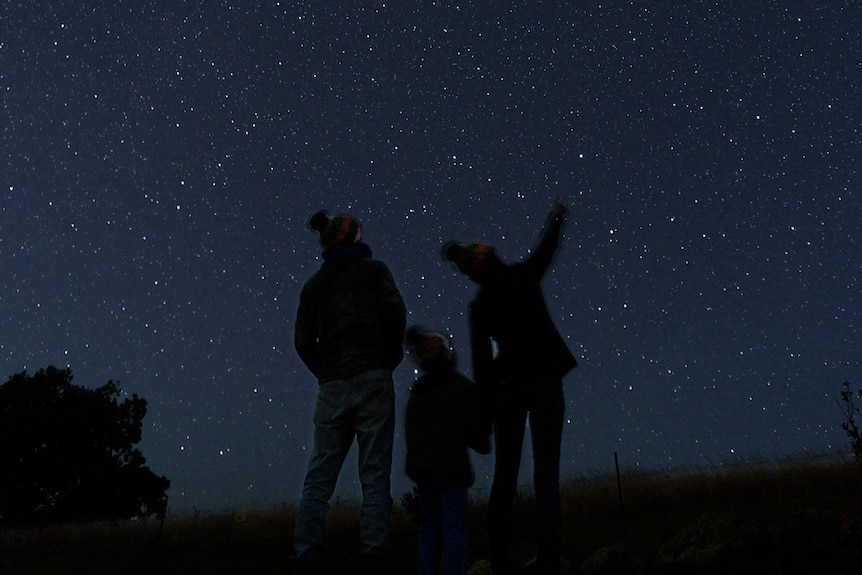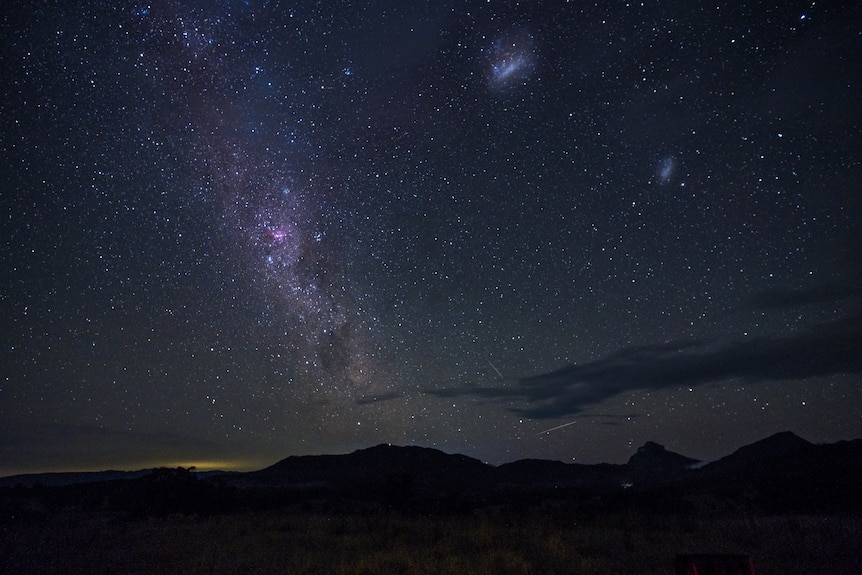Want to boost your mental health? Go outside and look at the night sky
Under the dancing lights of the aurora borealis, Heather Allansdottir finally felt at peace.
It was in the year 2019. He had left the UK for Iceland with the intention of ending ten difficult years working as a journalist and legal expert on the Arab revolutions of the 2010s.
But it wasn’t until he found himself beneath the aurora that his mind calmed down.
Loading…
“I felt like I had seen a miracle,” says Dr. Allansdottir.
In the end, it eased all my worries.
Dr. Allansdottir is not the only one with experience either. For ABC RN’s All in the Mind podcast, we spoke to a few people who felt refreshed when they stepped out under the stars.
But why would stargazing improve your health at all?
Measuring connectivity at night
Chris Barnes is an educational psychologist at the University of Derby in the UK, who studies nature connection – the connection people feel with nature and how that can benefit us.
With a keen interest in astronomy and the night sky, Dr Barnes wondered if the connection some people feel with nature during the day would also be there at night.
But when he checked the available scientific literature he was not satisfied, he decided to do research himself.

He says: “I found that there was very little in the research that talked about the relationship between people and nature at night.
“Not only is it the night sky and what it provides, but also the effect that light pollution has on people’s relationship with the night sky.”
So he set out to develop a scale that would measure how connected we feel to the night sky, aptly named the Night Sky Connectedness Index.
It is a 12-item test, each item being a statement such as “I find beauty in the night sky” or “I feel at home under the night sky”.
People respond with how much they agree or disagree, and are given points based on those responses.
The lowest score is zero, meaning no connection to the night sky, and the highest score of 120 means a very strong connection.
Dr. Barnes tested this night sky correlation measurement on over 400 people.
He also gave them tests that had been developed in previous studies: measures of happiness, stability and mental health.

Those who reported a strong connection to the night sky scored better on scales of mental health and happiness, Dr Barnes says.
“The more connected a person was to the natural environment at night, the happier they felt and the better their outlook and health.”
The findings were published earlier this year, and although this is an emerging area of scientific research, previous work – such as a 2014 study by British and American researchers – also supports the connection.
Why is stargazing good for health?
We don’t yet know exactly how or why gazing seems to improve health.
Dr Barnes says it could be a combination of the mental response people have when looking at the stars and the emotional response others feel when looking at the heavens.
In fact, it’s an opportunity to be present and have a good awe when you look up at the sky.
Dr. Allansdottir found exactly that sense of wonder and peace under Iceland’s aurora, and now gazes at the stars regularly.

“This is what people are talking about when they say being present or suspended or grounded or present, because when I look at the stars, that’s how I feel,” he says.
“For me, stargazing is a meditative experience.”
Time spent under the stars may have physiological effects similar to spending time in nature during the day, including reductions in blood pressure, reported stress and cortisol levels, Dr Barnes suggests.
“So we’re really going into this state of rest in the body that’s good for us.
“The more we do things like that, the more we’ll be able to see these health benefits.”

A connection related to light pollution
Together with health organizations, Dr. Barnes also investigated whether there is a relationship between how a person felt in relation to the night sky and the level of light pollution in their area.
The postal code or zip code of each study participant was recorded and used as a proxy for the level of light pollution the person was in.

When the researchers analyzed that data against the Night Sky Connectedness Index, they found that those living in codes with high levels of light pollution generally had lower scores, suggesting that they felt not connected to the night sky.
“Maybe that’s not surprising,” says Dr Barnes.
“But we were able to test for the first time this relationship between the severity of light pollution, which a person would not know, with the level of connectivity that we are able to measure and obtain information from our scale new.”
Scientists estimate that about 80 percent of people live under light-polluted skies. The Milky Way is no longer visible to a third of us.
Although much of Australia is unaffected by light pollution, the population density in our cities means the country has one of the highest levels of light pollution in the world.
Dr. Allansdottir says that light pollution and air pollution, which is the area in which he works as a legal expert, are important issues of our time.
“I wish that was on the political agenda,” he says. “And I hope we move to a place where mainstream politicians are talking about it.”
Listen to the full episode and subscribe to All in the Mind podcast for more stories about mind, brain and behavior.
Get a selection of mental health news from ABC by subscribing to our monthly newsletter.
#boost #mental #health #night #sky
